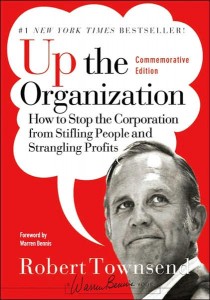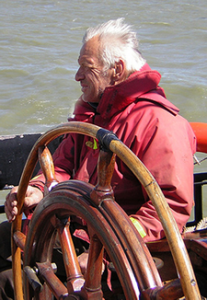 The title of this post is a play on the title of one of the best business books I know: Up The Organization by Robert Townsend. Townsend was president of Avis Car Rental in its prime and has some witty and insightful things about how companies (mostly big ones) should operate. The book has been revised and reprinted, but if you can find an out of print copy of his sequel Further Up the Organization, I recommend that one.
The title of this post is a play on the title of one of the best business books I know: Up The Organization by Robert Townsend. Townsend was president of Avis Car Rental in its prime and has some witty and insightful things about how companies (mostly big ones) should operate. The book has been revised and reprinted, but if you can find an out of print copy of his sequel Further Up the Organization, I recommend that one.
What Do You Mean Organization?
That’s reaction some entrepreneurs have. They don’t need no stinkin’ organization. They just tell people what to do. Then they scream and curse when it doesn’t get done right. But whenever you have two or more people working toward a common goal, you have an actual organization, whether you like it or not.
The trick to developing a growing, thriving organization is to push as much responsibility as possible down the organization.
Yes, Down The Organization.
The more things that are handled as close as possible to where the work is done, the more people at the top have time and resources to do more strategic things. But this is hard to do.
Why? Because the people at the top often have more experience and ability. At least we say that’s the reason. Yes, they often are more competent. But the reason it’s hard to push that competence down the organization is that people who are good at what they do have what’s called “unconscious competence”. Remember when you learned to drive a car? Remember the focus it took? You were developing competence – consciously. At some point you got so good you could drive and talk and listen to the radio, AND think about something else. You became unconscious of the movements needed to maintain speed, steer, put on the blinker etc. That’s unconscious competence.
People Don’t “Get It” When They’re Not Unconscious
Probably the person down in your organization, the one who should be given some responsibility, is not unconsciously competent. And if you just told them to do something they wouldn’t do it right. They wouldn’t get what you wanted done. It may not be that they can’t do the job, just that they need training, mentoring, oversight (aka management) to be able to execute that responsibility as well as it needs to be done. And that takes time and effort.
But more than time and effort it takes you being able to explain what you do well, and how you do it. That’s what trips most of us up. When we are so good that we are unconsciously competent, we can’t always explain to another person how it should be done. And so, we can’t figure out how to push some responsibility down to someone else. And we have to keep it ourselves. But that limits the growth of the company.

The Solution?
There are many: Checklists, Work Flows, Management Training, Mentoring, etc. “The Exercise of the Elves” is one of my favorites. They all take a skill set that is often quite different from the skill of actually doing the work. This is one reason many small companies stay small. They aren’t willing to invest in that skill. Big companies are. They hire people to do these things, or they bring in consultants [shameless plug] or both. Companies that aren’t willing to do this are forced to keep responsibility at the top and keep their organizations small.
But if you want to get out of the engine room and into the wheelhouse; if you want to take your company to new places; in short, if you want to function more like the CEO and less like the General Manager, it’s a skill you need to bring on board.